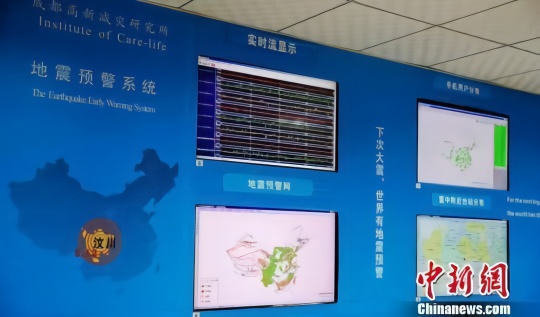


An earthquake early warning system in Institute of Care-Life in Chengdu (Photo/Chinanews.com)
China’s Sichuan province sent a warning before a 6.0-magnitude earthquake hit its Changning county at 10:55 pm Monday (Beijing Time), giving people life-saving seconds to prepare for the temblor.
According to Luo Qifeng, professor with China’s Tongji University, earthquake early warning is a system that signals alarm after the quake happens and before the longitudinal wave hits the surface.
At the beginning of an earthquake, longitudinal wave transfers faster than transverse wave that is more destructive. When detecting longitudinal wave, underground probes would send signals to computers which later calculates the magnitude, intensity and focus. This enables related departments to alarm the public through television and radio around 10 seconds before the transverse wave reaches the ground.
Luo noted that the early warning is different from earthquake forecast. An earthquake forecast predicts an earthquake that is very likely to happen, but the early warning is an alarm sent after the happening of the tremor and before the quake causes severe damages.
With the early warning system, high speed trains can be stopped; people can be evacuated from elevators; and important devices can be shut down before the transverse wave hits the ground.
However, as the warning has to be fast, sometimes the system may make incorrect calculations on the magnitudes and focuses of earthquakes. Therefore the academia is holding different opinions toward the technology. Some believe it is able to avoid losses, while others hold that its effects are no match for its input.
 Fire brigade in Shanghai holds group wedding
Fire brigade in Shanghai holds group wedding Tourists enjoy ice sculptures in Datan Town, north China
Tourists enjoy ice sculptures in Datan Town, north China Sunset scenery of Dayan Pagoda in Xi'an
Sunset scenery of Dayan Pagoda in Xi'an Tourists have fun at scenic spot in Nanlong Town, NW China
Tourists have fun at scenic spot in Nanlong Town, NW China Harbin attracts tourists by making best use of ice in winter
Harbin attracts tourists by making best use of ice in winter In pics: FIS Alpine Ski Women's World Cup Slalom
In pics: FIS Alpine Ski Women's World Cup Slalom Black-necked cranes rest at reservoir in Lhunzhub County, Lhasa
Black-necked cranes rest at reservoir in Lhunzhub County, Lhasa China's FAST telescope will be available to foreign scientists in April
China's FAST telescope will be available to foreign scientists in April "She power" plays indispensable role in poverty alleviation
"She power" plays indispensable role in poverty alleviation Top 10 world news events of People's Daily in 2020
Top 10 world news events of People's Daily in 2020 Top 10 China news events of People's Daily in 2020
Top 10 China news events of People's Daily in 2020 Top 10 media buzzwords of 2020
Top 10 media buzzwords of 2020 Year-ender:10 major tourism stories of 2020
Year-ender:10 major tourism stories of 2020 No interference in Venezuelan issues
No interference in Venezuelan issues
 Biz prepares for trade spat
Biz prepares for trade spat
 Broadcasting Continent
Broadcasting Continent Australia wins Chinese CEOs as US loses
Australia wins Chinese CEOs as US loses